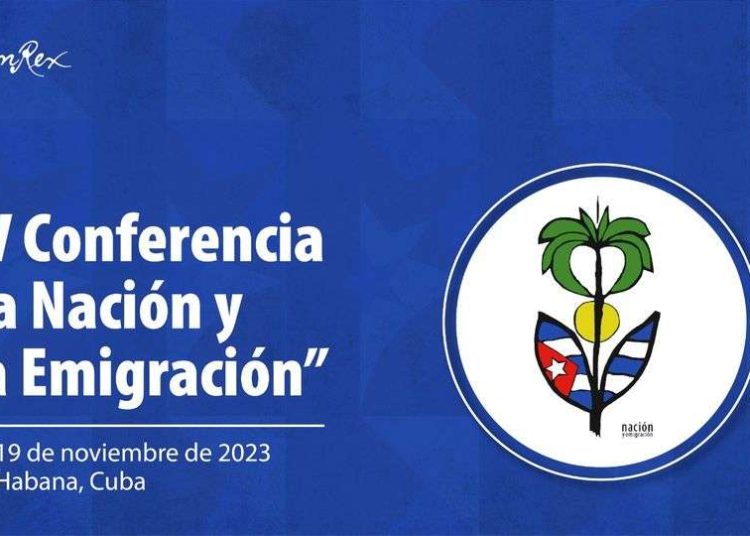The options open to Cubans residing abroad to insert themselves into the country’s economic system will be one of the topics that will be addressed at the 4th The Nation and Emigration Conference to be held in Havana on November 18 and 19.
“We are opening a special space to make known the significant already approved changes, but of little disclosure, in the possibilities that Cubans residing abroad have to participate in local development projects, in investments and other business opportunities,” Laura Ivet Pujol Torres, deputy director general of the General Department of Consular Affairs and Attention to Cubans Residing Abroad (DACCRE) of the Ministry of Foreign Affairs, said to Cubadebate.
.@BrunoRguezP: "Fortaleceremos, cada vez más, los vínculos con los cubanos residentes en el exterior y, en breve, acogeremos la IV Conferencia La Nación y la Emigración, que contribuirá a profundizar el diálogo entre el gobierno cubano y nuestros compatriotas."#MejorSinBloqueo pic.twitter.com/QIevUA0gnT
— Nación y Emigración (@NacionyEmig) November 3, 2023
The official added that the agenda of the meeting is extensive, with the possibility of exchanging everything that can contribute to “a fluid relationship with broad spheres of participation in different aspects of society: culture, sports, science and technology, business, politics and social communication.”
She also indicated that the aim is to stimulate ties with new generations of Cubans residing outside the island, “by strengthening cultural and historical ties with their country or that of their parents.”
For Pujol Torres, the objective is to involve all Cubans willing to contribute, regardless of where they live so that they also feel part of the process that the nation is experiencing.
“We will listen to everyone, with respect, even if we have disagreements of various kinds,” she affirmed.
The diplomat considered that there are few “pending” immigration issues since most would have been resolved during the last 45 years. However, she recognized the benefit of listening to emigrants, knowing their concerns and suggestions, especially with everything related to the approved immigration modifications.
Regarding these reforms, she highlighted that her focus has been to normalize the act of migrating, taking all measures so that people who decide to do so have access to regular, orderly and safe routes.
“And whoever wants to return, whether to visit or to establish residence, can also do so normally and without stigma,” said Pujol Torres.
“The event will allow us to continue advancing within our society, in the acceptance of the migratory act as something natural, because we have been, are and will be a country of migrants,” she stated.
The deputy director general of DACCRE highlighted that there is an important legislative moment with the preparation of bills related to migration, passport, immigration and citizenship, which are on the calendar of the current legislature.
“Everything discussed at the event can contribute early to this process, regardless of the fact that, when the bills are made public, everyone will have the opportunity to participate and give opinions electronically, as is normally happening,” she noted.
Palpable evolution
In her statements to Cubadebate, the Cuban Foreign Ministry official acknowledged that the relations between the country and its emigrants did not always have the positions that characterize current relations.
Pujol Torres assumed that since the triumph of the Revolution and until the so-called Dialogues of 1978 there were antagonistic positions “between a part of the citizens who migrate and the nation State.”
“Until then, leaving Cuba was a path of no return, Cuban laws stated it and, among the measures approved at that meeting, in addition to the release of more than 3,000 counterrevolutionary prisoners and prisoners for crimes associated with the migratory act, measures were adopted to facilitate family reunification and visits to Cuba for emigrants. In just one year, more than 100,000 Cubans traveled to Cuba. At that time, approximately a quarter of the total Cubans residing abroad,” she explained.
“Rather than listing the measures that took place throughout these years, whether or not associated with the time of the conferences, it is worth emphasizing that from that moment on an exercise of coherence, respect and continuous progress was unleashed, although not without contradictions,” the diplomat clarified.
Impact measures
The creation of DACCRE was one of the initial conference’s results. Since then, important steps have been taken, such as the reactivation of consular services that are today offered in 140 offices in 123 countries.
The effects have ranged from the creation and elimination of entry and exit permits, travel validity, invitation letters, extensions of stay abroad, to the most recent measures that eliminate passports extension, make getting passports cheaper, and extend their validity.
Regarding the impact of the latest modifications, Pujol Torres considered that “the best example of the acceptance that the measures related to the cost, the elimination of the extension and the extension of the validity of the passport to 10 years have had among Cubans residing abroad, is the significant increase registered in these services and the fact that almost half of them correspond to new applications.”
In her opinion, this means that many people who for years had not issued their passports have taken advantage of the benefits offered by the recent provisions.
“We also hope, in the medium term, that this will influence an increase in visits to Cuba,” she stated.










